
|
![]()
Greatest Films of the 2000s
2000 | 2001 | 2002 | 2003 | 2004 | 2005 | 2006 | 2007 | 2008 | 2009
Title Screen Film Genre(s), Title, Year, (Country), Length, Director, Description 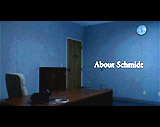


About Schmidt (2002), 125 minutes, D: Alexander Payne
Director Alexander Payne's existential character study and nihilistic black comedy told about a retired, recent widower seeking to find meaning in his life. 66 year-old Warren Schmidt (Oscar-nominated Jack Nicholson) was introduced as a reluctant, about-to-retire Omaha, NE insurance actuary who viewed his entire life as disappointing. In the opening shot, Schmidt was in his barren, packed-up Woodmen Insurance office building waiting on his last day for 5 PM to approach before his farewell retirement dinner at a steakhouse. He was praised by his young actuarial replacement, followed by a tribute from his inebriated best friend and co-worker Ray Nichols (Len Cariou). Later at home, after viewing a TV advertisement for a Third World outreach program, Warren received a mailing and impulsively enrolled. Soon, he became engaged in on-going correspondence with his "Childreach" adoptee (delivered in voice-over soliloquies "Dear Ndugu...") - a young, uncomprehending Tanzanian six year-old orphan named Ndugu Umbo. He vented and shared his feelings about his lack of accomplishments to the boy, and also expressed his suppressed anger about his long-time supportive, but homely and overweight wife Helen (June Squibb) after 42 years of marriage: ("Who is this old woman who lives in my house?"). He also showed loathing for his prospective future son-in-law - "nincompoop" waterbed salesman Randall Hertzel (Dermot Mulroney) who was about to marry his only child - mousy daughter Jeannie (Hope Davis). At a major turning point in his life, Warren discovered his wife Helen dead on the kitchen floor due to a stroke. While going through some of Helen's possessions in her closet, he discovered that she was involved in a secret, long-ago affair with a mutual friend - his co-worker Ray Nichols; enraged, he threw all of her possessions in boxes and took them to a recycling donation center, and then personally confronted Ray and punched him out. Leaving earlier than expected, Warren decided to take a road trip in a newly-purchased, oversized Adventurer R.V. to Denver to attend his daughter's marriage; his intention was to try and convince Jeannie to not marry the very-average Randall. He took a very meandering road journey on his way from Omaha, NE westward to Denver, visiting various sites including his childhood home, his alma mater Univ. of Kansas, and other tourist attractions. At an RV trailer campground, he met an overly-friendly RV couple from Eau Claire, WI, John and Vicki Rusk (Harry Groener and Connie Ray) who invited him for dinner; the night turned ugly when he made an unexpected pass at Vicki and was vehemently rejected - he raced back to his RV and fled from the campground. During the next starry night, Warren delivered a regretful prayer atop his RV to his deceased wife and asked to be forgiven for being an imperfect husband - lit by candles illuminating some Hummel figurines (that Helen liked to collect) that he had recently purchased. In Denver a few days before the scheduled wedding, he resided in the home of uninhibited, outgoing, flirtatious divorcee (and the mother of the groom-to-be) Roberta Hertzel (Oscar-nominated Kathy Bates). He was very uncomfortable with her description of the love life of Jeannie and Randall. To soothe Warren's aching back after sleeping on a waterbed his first night, Roberta invited the very unwilling Schmidt for an infamous nude hot-tub session in her backyard after the church marriage rehearsal and dinner at Tony Roma's. She casually approached the hot tub, greeted him and asked: "Mind if I join you?" as she stripped off her red robe to reveal her earthy, overweight body; she stepped into the hot tub completely naked; during their conversation, she hinted: ("Here we are, a divorcee and a widower. Sounds like a perfect match to me"), and touched his leg under the water. Intimidated by her, he jumped out as she asked: "What's the matter?" He gave an obvious excuse as he quickly retreated to his RV for the night: "Oh, I have to go to bed now"; she was astonished. During the reception scene following the wedding of his only daughter Jeannie to her fiancee Randall, Warren delivered an impassioned, kind, respectful and emotional speech full of tributes to all the members of each family, and found some self-healing and consolation. While returning home from the Denver wedding, Warren wrote a despairing last letter to Ndugu (heard in voice-over): ("Once I am dead and everyone who knew me dies, too, it will be as though I never even existed. What difference has my life made to anyone? None that I can think of. None at all"). At home in the climactic catharsis, he noticed in his stack of mail that he had received his first letter back from Ndugu's missionary mother superior at the orphanage. Enclosed was a stick-figure crayon drawing of a smiling Warren and six year-old Ndugu holding hands. She explained that the boy couldn't read or write, but appreciated his letters nonetheless. There was a closing close-up shot of a teary-eyed, elated Warren who realized that he had made a real difference in the illiterate young boy's life.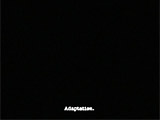
Adaptation (2002), 114 minutes, D: Spike Jonze
Meryl Streep played the captivating role of New Yorker writer Susan Orlean. In the weird and twisting drama, she was the author of the non-fiction book, The Orchid Thief, that writers'-block suffering Charlie Kaufman (Nicolas Cage) was struggling to faithfully adapt into a screenplay. In a parallel dramatization of the book, Susan went to Florida on assignment where she secretly fell in love with the subject of her own book, John Laroche (Chris Cooper), the orchid-stealing protagonist, and attempted to kill Charlie in the swamp. In the most startling improvised scene of the film, she snorted green powder derived from the orchid and became stoned - and got lost brushing her teeth, staring at her toes and re-creating the sound of a phone dial-tone.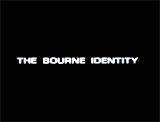



The Bourne Identity (2002), 118 minutes, D: Doug Liman
See Bourne series.
Bowling for Columbine (2002), 123 minutes, D: Michael Moore


Chicago (2002, US/Can.), 113 minutes, D: Rob Marshall



City of God (2002, Braz./Fr./US) (aka Cidade De Deus), 131 minutes, D: Fernando Meirelles, Katia Lund
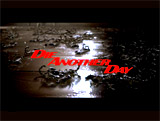


Die Another Day (2002), 132 minutes, D: Lee Tamahori
See James Bond series.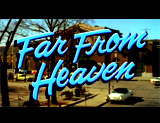


Far From Heaven (2002, US/Fr.), 107 minutes, D: Todd Haynes
This melodramatic, tearjerking romance was deliberately made as film homage to director Douglas Sirk's May-December romance drama All That Heaven Allows (1955), starring Rock Hudson and Jane Wyman. It was set in the same time period, but was reinterpreted with additional plot elements (sex, profanity, and violence) not possible for Sirk in his repressive era. It was advertised with the question: "What Imprisons Desires of the Heart?" In 1957, upper-class Connecticut housewife and homemaker Cathy Whitaker (Julianne Moore with her third Oscar nomination) was living a seemingly-perfect, insular life. Then, she found herself in a troubled relationship with her alcoholic husband Frank (Dennis Quaid), a closeted homosexual who was shockingly outed. Her pain, desperation and confusion spiraled out of control, but she for once was guided by her heart. For comfort and friendship, she found herself involved in an inter-racial relationship with kind, sensitive, well-educated, compassionate and non-judgmental African-American gardener and single father Raymond Deagon (Dennis Haysbert). Unfortunately, their socially-taboo friendship was further undermined by prejudiced gossip from Cathy's best friend Eleanor Fine (Patricia Clarkson), dashing its possibilities ("far from heaven"). She also experienced self-doubt, social ostracism, and more internal conflict in the bittersweet conclusion. She decided to give up her contact with Raymond when repercussions became too great and the world could not "see beyond the color, the surface of things."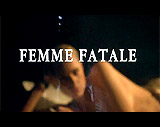




Femme Fatale (2002), 110 minutes, D: Brian de Palma
Writer/director Brian DePalma's erotic, neo-noirish, dramatic mystery thriller with a major plot twist was a glossy, visually-striking and lustrous, well-crafted cult classic. Its themes included voyeurism, deja vu, manipulation and deception, destinies crossing paths, and doubling (including mirroring, doppelgangers and double-identity). Except for the first half-hour (and the film's short concluding segment), it was almost entirely a dream of the title character's nightmarish future, after which the female protagonist attempted to change her destined fate. It often provided various obvious and crucial clues in plain sight to audiences, along with deliberately misleading, distracting and contrived happenings or far-fetched coincidences, forcing movie-viewers to pay close attention. The film's opening bravura sequence was set during the screening of the film Est-Ouest at the 2001 Cannes Film Festival. Mercenary con-thief for hire and blonde femme fatale Laure Ash (Rebecca Romijn-Stamos) joined together with two other accomplices: 'Black Tie' (Eriq Ebouaney) and Racine (Édouard Montoute) to steal jewels from a see-through gold-plated halter top (an "amazing top in the shape of a serpent"), encrusted with 500 diamonds (385 carats) and worth over 10 million dollars. The garment was being worn at the film event by Laure's partner-in-crime super-model Veronica (Rie Rasmussen). The heist occurred in the ladies room of the theatre between them as the screening was taking place. The double-cross and theft was accompanied by their hot lesbian/bisexual tryst in a toilet cubicle using a bait-and-switch tactic. For much of the rest of the film, Laure was on-the-run and hiding out in Paris to evade pursuit from her angry accomplices, and found herself plagued and pestered by the presence of long-haired, in-debt Spanish paparazzo Nicolas Bardo (Antonio Banderas) who was snapping incriminating pictures of her. Serious complications arose when Laure was mistaken for a missing, suicidal woman named Lily (also Rebecca Romijn-Stamos), her own look-alike doppelganger. Lily's aging parents brought Laure to Lily's apartment, where Laure came up with the idea of stealing Lily's passport and plane ticket to flee the country and impersonate Lily, in order to escape her vengeful, double-crossed partners. While taking a hot bath in Lily's apartment, Laure experienced a dream sequence -- about how she had appropriated Lily's identity in order to be redeemed and "start a new life." Much later in the film, she awoke from the dream (a nightmarish vision of her future) and had to reassess what had happened in the dream. She decided to give Lily - her doppelganger self - a second chance to change her future and not commit suicide - and to also find a way to escape from her own trapped fate.



Frida (2002), 120 minutes, D: Julie Taymor




Gangs of New York (2002, US/Germ./It./UK/Netherl.), 168 minutes, D: Martin Scorsese
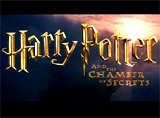



Harry Potter and the Chamber of Secrets (2002, US/UK), 161 minutes, D: Chris Columbus
See Harry Potter series.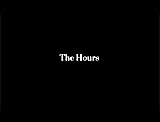
The Hours (2002, US/UK), 114 minutes, D: Stephen Daldry
Stephen Daldry's drama was about the stories of women (over generations) who were affected by the work and life of Virginia Woolf (Nicole Kidman), an ailing lesbian who was writing her novel Mrs. Dalloway in 1923 England, and feeling despairing and depressed. Julianne Moore portrayed troubled, brooding, depressed, and pregnant housewife Laura Brown in early 1950s Los Angeles. In a heart-wrenching, restrained and controlled performance, she deftly portrayed a sexually-repressed, despairing, and miserable woman suffocated and stifled by her kindly husband Dan (John C. Reilly) and needy child Richie (Jack Rovello). In a baking scene in which she produced a lopsided chocolate cake for her husband's birthday, she exhibited her futility, suffering, exhaustion, and loathing. By film's end, although she flirted with the idea of committing suicide, she unapologetically and willfully chose to abandon her family to find her autonomous self and purpose. The other woman in the plot was Clarissa Vaughan (Meryl Streep) - a lesbian career publisher living in present day New York of 2001. Her nickname, given to her by her poet-friend Richard Brown (Ed Harris) (dying of AIDS) that she was caring for, was Mrs. Dalloway.


Ice Age (2002), 85 minutes, D: Chris Wedge




Irreversible (2002, Fr.), 97 minutes, D: Gaspar Noe
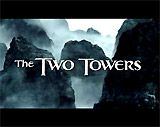



The Lord of the Rings: The Two Towers (2002, US/NZ), 179 minutes, D: Peter Jackson
See The Lord of the Rings series.
Peter Jackson's monumental, big-budget action/adventure epic (all three films) was a dazzling synthesis of many fantastical elements from J.R.R. Tolkein's masterwork about Middle-Earth: an heroic quest, good vs. evil, war stories, sci-fi creatures (dwarves, elves, goblins, orcs, etc.) and ancient wonders. Multiple story lines and epic battles were interwoven together in a story of friendship, loyalty, honor and courage. The quest was specifically to destroy a powerful artifact known as the One Ring, created by the Dark Lord Sauron (the eponymous "Lord of the Rings"), in order to end Sauron's lordship over the Elves and Middle Earth. A series of awe-inspiring battles culminated with the defeat of Sauron, an end to corrupted Wizard Saruman the White (Christopher Lee), and the destruction of the Ring. Innovative motion capture created the unforgettable creature of Gollum (Andy Serkis) (once a good hobbit named Sméagol), who served as the wretched guide to young hobbits Frodo (Elijah Wood) and friend Sam (Sean Astin) during their mission - to return the Ring to Mordor and destroy it in Mount Doom's molten lava.




Minority Report (2002), 145 minutes, D: Steven Spielberg
Director Steven Spielberg's futuristic, who-dun-it sci-fi, action crime-thriller, that presented the philosophical debate between fate and free will, was based on the 1956 short story of the same name by Philip K. Dick (with a screenplay by Scott Frank and Jon Cohen). The film was successful financially and critically, with one Academy Award nomination (Best Sound Editing). In the film's opening set in the Washington, DC headquarters of the prototypical Pre-crime Department - in the year 2054, law enforcement was advanced by using three psychic 'precogs' lying in flotation tanks with their brains wire-connected to computers. They helped to pre-visualize, forecast or envision future heinous crimes (in order to prevent their occurrence). A very fragile and talented female Pre-cog named Agatha (Samantha Morton) and two twin boys Arthur and Dashiell (Michael and Matthew Dickman) were able to see impending future murders and help deter crime (however, they could not see assaults, rapes, or suicides). A vision signaled by the receipt of a "red ball" indicated that the predicted crime was not pre-meditated but a crime of passion, while a "brown ball" indicated pre-meditation, allowing sufficient lead time to apprehend the criminal. Competent and ambitious DC lead enforcement officer-cop John Anderton (Tom Cruise) worked in the Pre-crime unit under the leadership of its founder, the charming and respectable Lamar Burgess (Max von Sydow). Anderton was revealed to be psychologically-depressed and grieving following the disappearance/murder of his young son Sean six years earlier; he was deeply haunted by his past and was suffering from drug addiction, and had become estranged from his wife Lara Clarke (Kathryn Morris). The future of the Pre-crime division was in jeopardy, due to the presence of fastidious US Dept. of Justice agent Danny Witwer (Colin Farrell), who was conducting a division-wide audit. He was provoking trouble and endangered the program due to his belief that the predictive technologies were inaccurate and humanly flawed. Anderton also became curious about one of the division's earliest and oldest cases - Agatha's pre-vision of the attempted drowning of neuroin-addicted Anne Lively (Jessica Harper) at Roland Lake. (Both Anderton and Witwer eventually discovered discrepancies in the pre-vision data streams regarding the Lively murder.) As Anderton looked further into the case, he was simultaneously shocked to learn that the next Pre-crime revealed by Agatha's premonition was the visualization of his own violent murder of Leo Crow (Mike Binder) in 36 hours - Crow was someone he had never met. Anderton's job was threatened and he went on the run, while believing that he had been framed. He learned an important fact that in all cases of premonition, the original data stream was still retained in Agatha's predictive memory. Anderton broke into the Pre-crime facility, kidnapped Agatha, and was able to download and record Agatha's predictive pre-vision memories. He was able to record Agatha's projected images of the killing of Crow, but according to Agatha's own admission, there was no post-murder "minority report" that would save him; a second projection (that was downloaded and recorded) was of Agatha's original memories of Anne Lively's drowning death by a masked man. During the predicted confrontation in a hotel room between Crow and Anderton, Anderton followed Agatha's advice and arrested Crow rather than killing him. Incredibly, Crow was upset and begged to be killed by Anderton, claiming that he had been assured financial stability by an unknown individual for allowing himself to be set-up as the murderer of Anderton's son Sean - this was clear evidence of a conspiracy against Anderton, to compel him to become angry enough to commit murder and remove him from the Lively investigation. In frustration, Crow grabbed Anderton's gun and shot himself to death - fulfilling the Pre-Cogs' vision. Simultaneously but separately, Witwer and Anderton realized that there was missing data and other discrepancies in the Anne Lively murder case. It appeared that a second faked 'echo' recording existed that revealed the actual murder (and murderer) of Anne Lively. The cold-blooded, tyrannical Burgess, who Witmer revealed as the murderer, had no choice but to shoot and murder Witwer to silence him. Anderton was also arrested and charged with the two murders (Crow and Witwer), and imprisoned in the Pre-crime Containment unit. After his escape aided by his wife Lara (who realized that Burgess was the calculating mastermind who had drowned Anne Lively), the film concluded during a lavish dinner at a DC hotel to celebrate Pre-crime's national launch, where Anderton had arranged for the guests to view Agatha's past pre-vision of the Anne Lively drowning. He cleverly unmasked Burgess as the hooded murderer. Burgess had arranged the deadly conspiracy to save his Pre-Crime unit. In the past, Anne had been drug-addicted and forced to sell her pre-cog daughter Agatha to the program, but now had cleaned up her neuroin drug habit and wanted to remove her fragile daughter from the pre-crime flotation tanks. Threatened by the thought, Burgess wanted to prevent the shut-down of his sinister, futuristic law enforcement organization, and had decided to murder Anne Lively - Agatha's mother - and eliminate the recording of the murder by regarding it as a fake "echo." Simultaneously, a new Pre-Crime "red ball" report was generated that predicted Anderton's murder by Burgess during their face-to-face confrontation on the hotel's roof-top balcony. Caught in a "Catch-22" dilemma, Burgess decided to select his own fate and committed suicide by shooting himself. As a result, the six-year Pre-Crime experiment was abandoned.


My Big Fat Greek Wedding (2002), 95 minutes, D: Joel Zwick
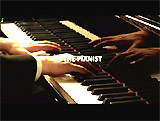


The Pianist (2002, UK/Fr./Germ./Neth./Pol.), 148 minutes, D: Roman Polanski



Punch-Drunk Love (2002), 95 minutes, D: Paul Thomas Anderson
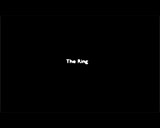


The Ring (2002), 105 minutes, D: Gore Verbinski


Russian Ark (2002, Russia/Germ.) (aka Russkij Kovcheg), 96 minutes, D: Aleksandr Sokurov




Secretary (2002), 111 minutes, D: Steven Shainberg



Signs (2002), 106 minutes, D: M. Night Shyamalan



Solaris (2002), 99 minutes, D: Steven Soderbergh



Spider-Man (2002), 121 minutes, D: Sam Raimi
See Spider-Man series.



Talk to Her (2002, Sp./Fr.) (aka Hable Con Ella), 101 minutes, D: Pedro Almodovar
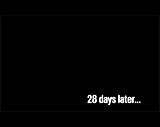



28 Days Later... (2002, UK), 99 minutes, D: Danny Boyle
One of the best zombie movies ever and a big hit film - an intense struggle for survival, with creepy scenes of a desolate and deserted London. In this zombie film (shot on digital video), zombification took place almost immediately (10-20 seconds). Some would argue this post-apocalyptic, plague disaster-drama wasn't a pure 'zombie' film - the creatures were virus-plagued or infected monsters or ghouls. Animal activists had attempted to release experimental chimpanzees (infected with a zombie virus known as the "Rage") from their cages in a primate research laboratory in Cambridge, England, and one was bitten. 28 days later in post-apocalyptic London after the accidental release of a highly-contagious, blood-borne virus had decimated the city (and was rapidly spreading throughout the world), mad, "Rage"-infected, red-eyed zombies were running rampant. One of the survivors, Jim (Cillian Murphy) a bicycle messenger, awoke from a coma in St Thomas Hospital, after being run down. He realized that a completely devastated London had been evacuated. He met up with two other uninfected survivors: Selena (Naomie Harris) and Mark (Noah Huntley) who were seeking shelter in the London Underground. There was a suspenseful scene in a tunnel as the group changed a tire and zombies approached. After Mark was bitten and infected - and had to be killed, the two met more survivors: taxi driver Frank (Brendan Gleeson) and his teenage daughter Hannah (Megan Burns). Eventually, the surviving trio (minus Frank who was contaminated with a drop of infected blood) reached a rag-tag military outpost (an old mansion) in northern England near Manchester commanded by Major Henry West (Christopher Eccleston), suspected to be power-hungry and mad. The two females were harrassed and needed protection from the sex-hungry military soldiers, who wanted to use them for breeding stock. One zombie, infected soldier Private Mailer (Marvin Campbell), was chained up for experimental purposes. It was revealed that the virus had NOT spread beyond the UK and had not infected mainland Europe. About two months after the outbreak after escaping the mansion and living in a remote cottage, Selena, Jim, and Hannah spotted a Finnish rescue helicopter - with the hopeful promise of being saved.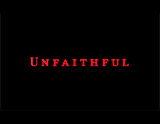



Unfaithful (2002), 124 minutes, D: Adrian Lyne
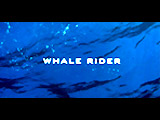


Whale Rider (2002, NZ), 101 minutes, D: Niki Caro